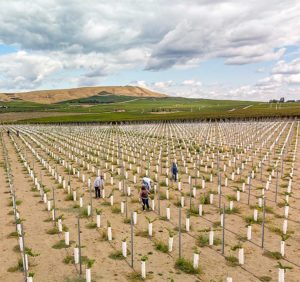—story by Kate Prengaman
—photo by TJ Mullinax

The Washington State Grape Society and Washington State University held their annual field day Aug. 7, hosted this year at Figgins Winery in Walla Walla.
The site offered a chance for viticulturist Jason Magnaghi to talk about his new plantings on rootstocks and how the vineyard’s practice of cane burial came in clutch after the cold damage the vineyard site sustained this year.
It also provided Michelle Moyer and Gwen Hoheisel from WSU Extension an opportunity to have field day attendees try their hand at scouting for signs of phylloxera damage. Like many vineyards across the state, the Figgins estate vineyard is dealing with challenges from the root-feeding pest in some of its own-rooted blocks.
Inviting the wider industry to look for the signs of phylloxera in its vineyards is an opportunity to help everyone deal with the challenge posed by the pest, Magnaghi said.
The key to scouting is not to dig for root samples under the worst vines, Moyer said. The pests have likely already moved on to feeding on neighboring vines with healthier roots, leaving the damaged vines with no fine roots. She recommends digging under drip emitters in September, when soils cool slightly, and using a hand lens to examine the fine roots, looking for small, discolored galls or for small, pale, football-shaped insects.
The field day also featured a talk on a new weed-control technology — electrical current application — from WSU weed scientist Rui Liu and her collaborators at Burrows Tractor.







Leave A Comment